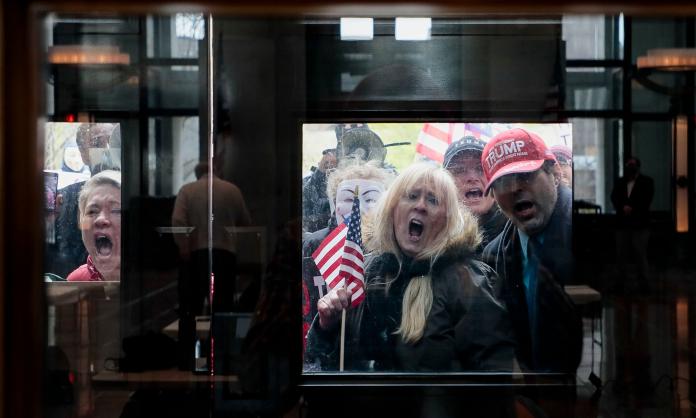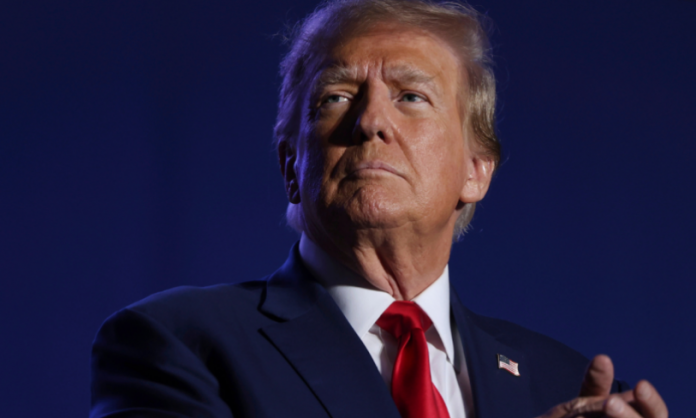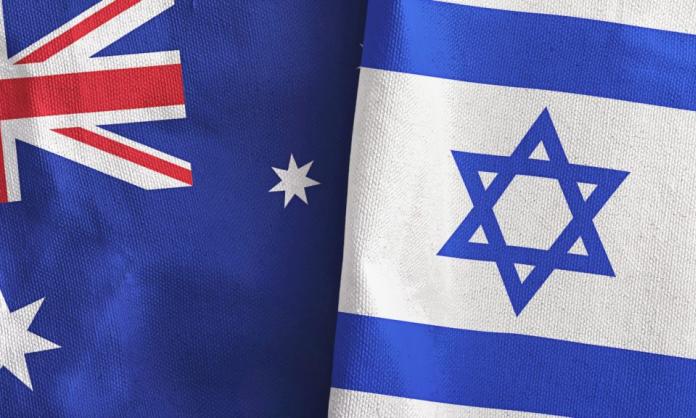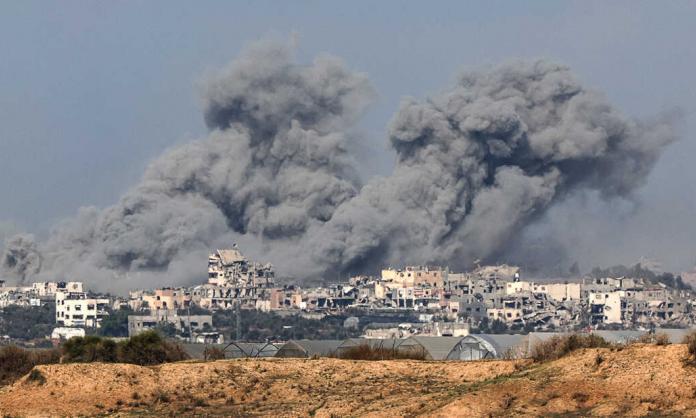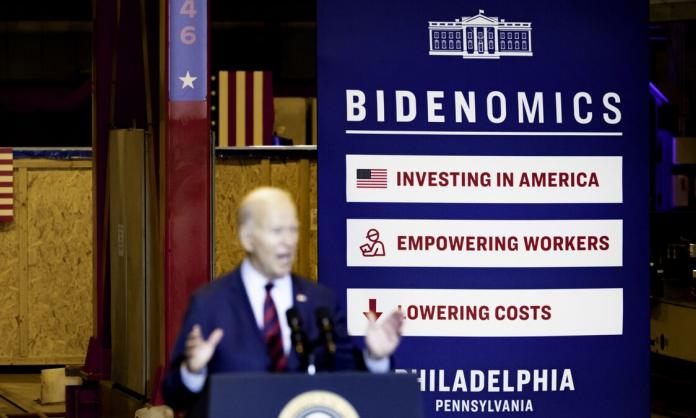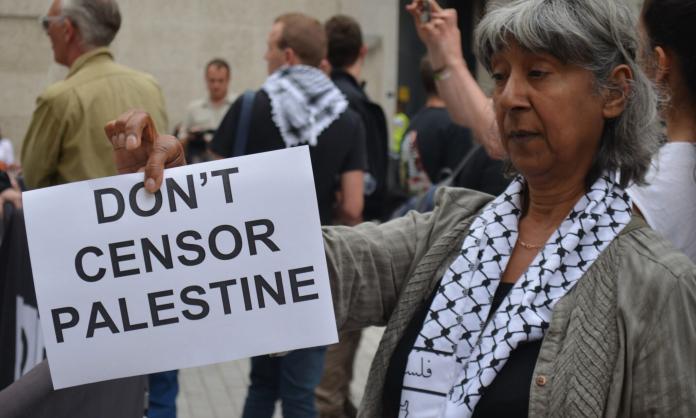Oh, say can you see, by the dawn's early light,
What so proudly we hailed at the twilight's last gleaming?
Written after an unlikely victory over the British, the opening lines of the US anthem evoke a vision of a tattered flag fluttering over a closely fought battle for freedom. Here, it was promised, a nation would be built based on unprecedented democratic rights. To this day, the gospel of American exceptionalism is widely promoted. US politicians breathlessly professes their love of country at every opportunity. For 70 years, Hollywood blockbusters have found new ways for America to save the day, each unlikely act of heroism more grating than its predecessor.
Yet for many who lived through the last century, the US anthem – and the flag it celebrates – inspires only hatred, fear and disgust. Never has a single country caused so much violence, destroyed so many lives, set back so many attempts at human liberation. While the Pentagon’s endless wars turned many against US foreign policy, the country was still seen as a beacon; a place where migrants from around the world could seek shelter, get a job, buy a house, raise a family and live the American Dream.
The coronavirus has now exposed the truth to the entire world: America is a nightmare. Its institutions are corrupt and unresponsive, its hospitals are overcrowded and understaffed, its working poor are treated with disdain.
Up to 2,000 people are dying daily from COVID-19. The private, for-profit system of health care made the current crisis far worse for those at the bottom of the pile. Roughly 28 million US citizens still have no access to insurance. Even those with access to cheap schemes are confronted with thousands in additional expenses for the most basic treatments. As a result, many make the choice not to see a doctor. The consequences are deadly. A Gallup Poll published in September last year found that 20 percent of all non-white Americans have lost a loved one in the last five years simply because they could not afford health care.
Now the horrors are multiplying. Black people make up 70 percent of people who've been killed by COVID-19 in Chicago, a story that is repeated across the country. Blacks and Latinos are more vulnerable to the disease because of decades of underinvestment in their communities. They also have much higher chances of being poor and suffering from conditions like diabetes and heart failure. But the shocking casualties also reflect their position in the economic system. People of colour tend to work in essential – and therefore, dangerous – sectors such as sanitation, supermarkets, hospitals and public transport. They don’t have the luxury of staying home during the crisis.
Contrast that with executives at investment bank Goldman Sachs. The company recently purchased two private jets to keep them safe while cavorting around the globe. Their ritzy Manhattan HQ is just down the road from the money starved hospitals in which thousands are dying due to lack of equipment.
US capitalism has been painfully slow to produce masks, ventilators and other urgently needed equipment. Companies that moved factories offshore have been useless in this crisis, as exports of essential medical supplies have been banned almost everywhere. Attempts by trade adviser Peter Navarro to force big pharma back to the US have been resisted thus far, and even the relatively simple act of reorganising existing factories to produce essential goods instead of cars and bombs has taken months to get going.
This has put the US in the same basket as almost every other country on earth – reliant on China for urgently needed medical supplies. It is hard to think of a better indicator of the shift in the global order than the sight of New York City, the economic capital of America, receiving aid from China, a country that was considered little more than a giant sweatshop only a few years ago.
It's not just the health system. More than 22 million people have lost their jobs because of the lockdowns. On 9 April, 10,000 families lined up in their cars for hours at a San Antonio Food Bank distribution event called Mega Giveaway. Across the country, food banks are incapable of meeting demand – and this is just the beginning of the crisis. At the same time, David Yaffe-Bellany and Michael Corkery report in the New York Times that farmers are destroying tens of millions of kilograms of fresh food they can’t sell:
“The amount of waste is staggering. The nation’s largest dairy cooperative, Dairy Farmers of America, estimates that farmers are dumping as many as 3.7 million gallons of milk each day. A single chicken processor is smashing 750,000 unhatched eggs every week. Even as ... farmers have been plowing fresh vegetables into the soil, they have had to plant the same crop again, hoping the economy will have restarted by the time the next batch of vegetables is ready to harvest. But if the food service industry remains closed, then those crops, too, may have to be destroyed.”
On one hand, the threat of starvation. On the other, too much food. Welcome to American capitalism – the richest Third World country on the planet.
The US political system has long been one of the most stable in the advanced capitalist world. But the strains of trying to hold together a collapsing system are starting to show. “President Trump” is a joke that was, at times, mildly amusing. Now it is a disaster. It is hard to recall a less impressive or competent world leader, a man who undermines American prestige every time he opens his mouth. While this loss of face is welcome, the misery and death that is being caused by his profit-driven policies are not.
But the crisis of US politics goes well beyond Trump. The Republican Party has been captured by successive waves of right-wing lunatics. Where they dominate state legislatures these hyper-conservative activists have tried to ban abortion and trade unions, and turned science classes into Bible groups. It’s no surprise that, until recently, many were echoing Trump’s claim that the virus was a hoax. That Trump remains overwhelmingly popular in the Republican base sums up this descent into madness – this frenzied mob will be the basis for an all-American fascist movement.
In this context, the Democrats have failed to do any damage to the Trump administration, and their presidential candidate is hiding in a basement. They’ve also opposed any attempts to build ongoing social movements to push back against the radicalising Republicans. Instead, they invited the FBI and CIA into their #Resistance, clearly not fussed by decades of assassinations, counter-insurgencies and coups.
Though the pandemic and the economic crisis it has triggered makes a Trump victory in the upcoming presidential elections less likely, it is incredible that such a bigoted, idiotic clown has survived in the top job for so long. They say that fish rot from the head down. By this measure, the US is well on its way.
--------------------
After centuries of unrivalled dominance, the roman empire collapsed in a heap, its social, political and economic institutions weakened by decades of elite debauchery and imperial overreach. A civilisation that produced brilliant works of art, and infrastructure that still stands almost two millennia later, disappeared. As the US struggles to deal with the effects of the novel coronavirus, it’s hard not to think that we’re seeing the end of its imperial dominance.
The US entered the 21st century with the swagger of a cowboy who’d defeated all the Indians. The neoconservatives had a plan for a New American Century; according to them, the world was begging to be set free by the US military. After 9/11 there was no turning back. We were told that Saddam Hussein, working with Osama Bin Laden, could deploy weapons of mass destruction anywhere in the world. America was in the firing line, the bombs could start dropping at any second, our freedom was in peril.
Despite declaring victory not long after invading Iraq, and while the occupation of Afghanistan was only beginning, the US lost, and lost badly. Years of immeasurable destruction didn’t bring victory any closer, nor did the poisoning of entire cities with depleted uranium, the deliberate stoking of sectarian tensions or the systematic torture of innocents in Guantánamo and Abu Ghraib. The neocons published a shopping list of countries to be liberated, known as the “axis of evil”. Now they couldn’t even subdue two of the poorest countries on earth. This was more than a minor annoyance; it was profoundly humiliating and triggered a major imperial crisis.
If this wasn’t enough, the global financial crisis hit the US hard. Millions were thrown out of their homes as predatory lending practices by dodgy banks threatened to bring down the world economy. A newly elected Barack Obama threw billions at the banks to prop up the system, but the next decade was an achingly slow economic recovery that left many poorer than they ever had been. While America emerged stronger than its European and Japanese rivals, China’s stronger growth rates reduced the output gap between the two countries.
The current meltdown threatens the empire in more ways than one. First, it is throwing American workers into the kind of poverty we’re used to reading about in history books. A 30 March NBC report suggested that the official figures understate the catastrophe because millions cannot apply for benefits, including workers reliant on tips and those employed in the gig economy. The St Louis district of the Federal Reserve Bank predicts that 48 million workers will lose their jobs. From the perspective of the US empire, all this is secondary. Workers are expendable at the best of times. What matters for the US ruling class is that the US might be stuck in lockdown for months while China opens for business. If that is the case, China will have a greater claim to economic leadership than ever before.
While it’s easy to point to Trump’s bungling of these and other issues, the erosion of US economic and imperial power predates the current administration. Ironically, it is a consequence of decades of neoliberal policies, broadly understood as globalisation, during which US companies sought access to cheap labour and new markets by setting up shop across the world. These shifts reflected and consolidated US economic and political hegemony in the post-war period. While supply chains functioned, these global networks of just-in-time production led to huge profits for those at the top by increasing the rate of exploitation for workers in the US and across the world.
Yet globalised production had a contradictory effect. It increased the profitability of individual companies, but at the cost of weakening the capacity of US manufacturing as a whole. Trump and his economic advisers have been fighting to turn this around. But it’s too little, too late. The country is struggling to meet its own needs, leaving it with little capacity – or credibility – to help manage the global crisis. In the aftermath of World War Two, the US funded the reconstruction of Europe. Now it can hardly fix its own highways.
Signs of US weakness can be seen everywhere. Take the price war over oil that broke out in March. It is incredible that Saudi Arabia, a key US ally, would try to bankrupt the US shale sector in such a moment of general instability. A decade of regional conflict has created a situation in which sub-imperial powers are increasingly confident to act without consulting Uncle Sam.
This comes after a year in which the US finally was defeated in both Iraq and Afghanistan. Eighteen years after invading Afghanistan to destroy al-Qaeda and the Taliban, the US was forced to sign a peace deal that gives the latter power over what’s left of the country. Meanwhile, in Iraq, pro-Iranian forces convinced most of the parliament to call for the expulsion of US forces. A country that was meant to become a permanent outpost of US power is now largely under the influence of Iran, its bitter enemy.
--------------------
Though millions might celebrate the end of the uniquely American combination of extreme capitalism and endless war, we’re not there yet.
The US is still the kingpin in the world of global finance. Its dollar is the main reserve currency, which gives the Federal Reserve a lot of power. The US is now underwriting the central banks of 13 of the world’s largest countries, plus the entire European Union. It also means the US can basically print as much money as it likes.
America also has substantial sway in organisations such as the United Nations, the International Monetary Fund and the World Bank, which regulate the global system. These organisations were formed at the height of US power after World War Two; their main function is to preserve and project its influence across the world.
The most important factor of all is the enormous, unrivalled power of the US military. America spends more than one-third of the global military budget each year, greater than the next seven countries combined. As well the US has more than 800 military bases in over 80 countries. Every other country combined has 70, China just one. The US also boasts by far the largest and best equipped navy, illustrated by its 11 aircraft carriers to China’s two. It remains the only nation capable of killing innocent people on any continent in a heartbeat, and its nuclear arsenal is large enough to wipe out the world many times over.
The crisis of US imperialism, just one symptom of the broader malaise of modern capitalism, is making it impossible for things to go on as they have before. Millions are learning that the system cannot provide just when people need it most. The capitalist system is like a decrepit old boxer, swaying on his feet, begging to be knocked out of his misery.
But like the US empire, capitalism will not go down without a fight. It will keep swinging to the very end, taking us all down with it. Despite the much-publicised breakdown in US social services and infrastructure, the US empire was never built on high wages for its workers or a functioning healthcare system. Rather, it was built on a ruthlessly productive economy capable of producing more weapons of mass destruction than anyone else. For now, it still has an overwhelming advantage. We’re not yet at a point where a foreign power will sack Washington, D.C.
Regardless, socialists have no stake in the rise and fall of rival imperial powers, just as we have no stake in the competition between Adidas and Nike. We can celebrate the crisis facing the US ruling class, managers of the most brutal and violent system the world has ever seen. But as long as capitalism survives, the retreat of an old power simply creates space for new aspiring powers to act more forcefully. That kind of multipolar set-up can be just as destructive as a unipolar one, as the people of Syria, Libya, Yemen and elsewhere have recently experienced first-hand.
Capitalism, not simply US imperialism, is the source of inequality and injustice the world over. It is imperative that the current crisis does not just mark the end of the disgusting US model, but the capitalist system as a whole.




